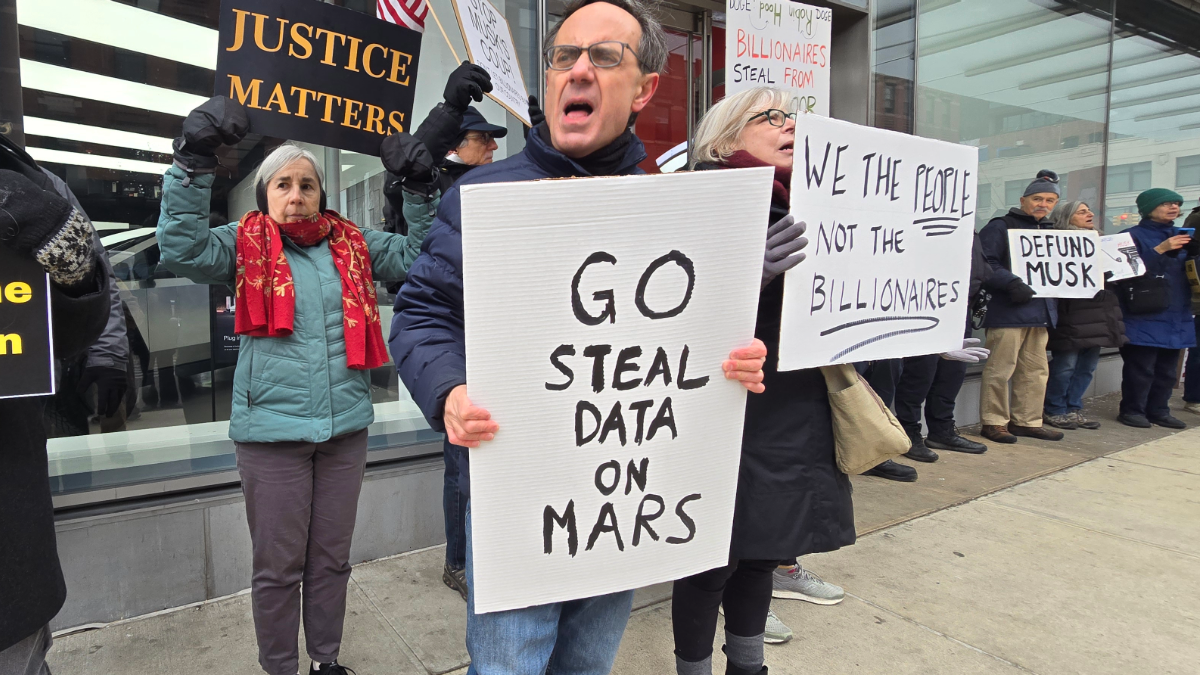DOGE Is Using AI To Centralize Government Power. It’s Time to Flip the Script.
Eric Gordon, Neil Kleiman / May 2, 2025
February 15, 2025—Demonstrators gather outside the Tesla showroom in Manhattan, holding signs and engaging in chants protesting Elon Musk, DOGE, and the influence of tech billionaires. Justin Hendrix/Tech Policy Press
The “civic tech” movement was hijacked by the Trump administration’s January 20 executive order rechristening the US Digital Service as the Department of Government Efficiency (DOGE). Now, the push to use tech to strengthen democracy has effectively been commandeered to weaken it.
The term civic tech encapsulates the work of a broad swath of activists and public leaders with an ambitious goal: using digital technology to dramatically improve people’s lives. In practice, this means using computation to slice through so-called red tape, boost government efficiency, expand access to critical services and information, and enable participation in our democracy.
Municipal governments in particular have leaned on the concept to establish thousands of useful apps and service improvements, ranging from an open data platform in Cincinnati to a resource for people seeking affordable housing in San Francisco. The national embodiment of the movement was the US Digital Service (USDS), established in 2014 after the Obama administration’s botched healthcare.gov rollout. Since then, USDS has quietly supported an array of life-saving and government improvement functions, from helping to distribute COVID-19 tests to providing critical data analysis during the 2022 infant formula shortage to making veterans’ benefits more accessible.
That mission all but ended three months ago when USDS became a convenient shell for the DOGE take over. Now this civic tech mothership is using AI and other advanced technologies to burrow deep into administrative datasets and monopolize control.
According to reports, DOGE, under the leadership of the billionaire Elon Musk, has scanned federal employees’ communications to identify anti-Musk or anti-Trump sentiment and is seeking to merge federal databases with personal information about US residents into one master database.
It’s time to flip the script (again) and break the government’s stranglehold on information. Rather than centralize power, let’s use AI to distribute it.
While some suggest this is the exact wrong time to have more AI thrust into our lives, we believe it is one of the few paths back to democratic input and government efficiency. This may sound counterintuitive, but AI can shatter the long-held government monopoly on information.
Unlike many past technologies, AI can make information far more accessible, empowering communities to make data-driven decisions. Put simply, it converts vast, unwieldy amounts of data into simple and easily discernible language. But as with all technologies, the intent of its use determines the result. Technology is not the problem; the application is.
Now is not the time to despair and give up on the mission of civic tech or even on government use of AI. Well before the Trump administration assumed power, the public sector collected vast sums of data about its constituents. Tools were developed both in and out of government agencies to use data for public benefit. But the recent availability of generative AI has significantly upped the stakes. The value proposition of civic tech is now shrouded by the clear and present threat of AI-enabled surveillance.
This is why we need a full-throated endorsement of the democratic values of civic technology. For decades, we have sought to use technology creatively to democratize access to government data and information. One of the best examples is 311, a problem-reporting tool used in most major US cities. It allows any resident to simply pick up their phone — or tap their 311 app — and report potholes, streetlight outages, or another public service issue impacting their community.
When it was introduced roughly 30 years ago, 311 revolutionized how governments responded to public problems based on community-generated data. Local governments were able to directly respond to resident reports, with some level of public accountability. Under the umbrella of civic tech, hundreds of apps and tools have been created since with similar goals of streamlining government operations and making programs accessible to more people. Now, DOGE is altering the public perception of civic tech. Musk has turned efficiency into shorthand for attacks on the federal bureaucracy and on human rights.
The civic tech movement needs to take back the narrative by moving away from the language of streamlining and towards the language of access, inclusion, and accountability. AI can help us get there. If used wisely, AI has the potential to bring this clarity and make data directly responsive to citizen needs, making it possible to center communities in decision-making.
Some new AI-powered platforms reveal promise. Talk to the City is an open-source AI tool used in Michigan to create shareable insights from conversations with formerly incarcerated individuals on challenges they face accessing services. Similarly, Real Talk for Change uses AI to suggest themes from dozens of community conversations, and makes audio quotes available as evidence. The result is a publicly accessible tool that was prominently used to provide city-wide inputs into the 2021 Boston mayoral race, as well as many other applications. Adding these voices to the public record in a searchable and accessible form shifted the conversation in both places to center typically ignored perspectives. We can similarly use new AI technology to disrupt traditional government processes and shift power toward constituents that have been historically denied it.
Effectively deploying AI is no small task. It will require a different government revolution than the one promoted by DOGE. To make this vision a reality, we need researchers, leaders, practitioners, and institutions to come together and jointly take this on.
Take Boston, where the vast portion of violent crime is concentrated in a few neighborhoods, including Dorchester. Although Boston has reduced homicides and shots fired in recent years, some communities remain especially vulnerable to gun violence. A group of Dorchester residents, supported by the new RethinkAI collective, is discovering how to represent that experience by using generative AI to connect years of transcripts from community meetings to real-time data about local crime and disorder. Crime data tells only part of the story. The ability to make sense of years of conversations, alongside 311 and crime data, will help the City understand how residents experience changes on the ground. The resulting dashboard and chatbot will be owned by the community and used to engage city planners and policymakers on crime prevention and other issues.
More governments should be thinking about how generative AI can allow them to distribute the power of data collection, analysis, and use directly to communities.
The DOGE takeover deepens the view of government data as a resource exploited by a few elite (and private) actors. But AI use in this context is still very much undefined, and it can help genuinely democratize information. Especially at state and local levels, we can still reclaim civic tech from power brokers and give it back to the people, for the people.
Authors

